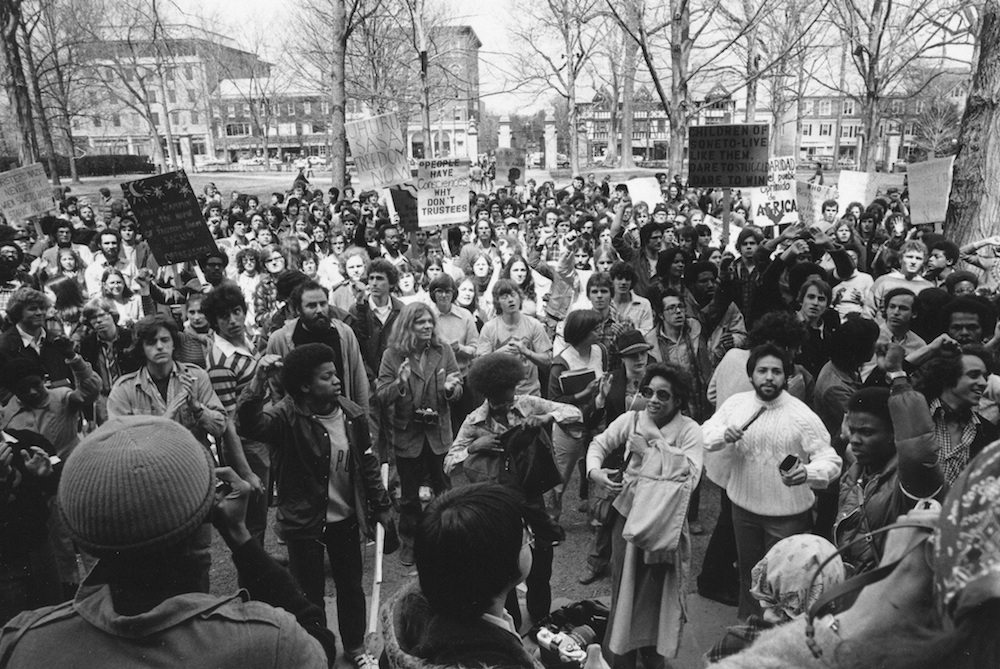-

Soul Music
Hundreds of people are crammed into a tiny room and the room is pulsating—not in a figurative, metaphorical sense, but literally. Bodies bounce against each other, arms and legs thrash out angularly, and heads bang in unison.
-

In the Nation’s Pocket
Student activists campaigning for divestment—from fossil fuel companies, weapons manufacturing companies, or companies operating in the Israeli-occupied West Bank—must face an administration that for decades has refused to acknowledge the central point at the very core of any divestment campaign: that the university’s investments should be considered as part of the university itself.
-

Barry
Barry (whose name has been changed for this article) is a gangly kid who looks to be somewhere in that stretch of late adolescence characterized by patchy moustaches. In another world, Barry, gregarious and talkative, would be captain of his school’s debate team, or maybe a theater major. He is funny and he knows it.
-

Back to Basic
The word “basic” was dead by the time Kreayshawn said it in 2011: “Gucci Gucci, Louis Louis, Fendi Fendi, Prada / Basic bitches wear that shit so I don’t even bother.” But in the word’s afterlife, “basic” has ceased to apply just to “basic bitches” and now affixes itself to all sorts of actions, objects…
-

Jewish Wisdom
Dear Aron & Josh, Someone in my frat is making me fast for a week. I really don’t want to drop out of the frat but I don’t know if I can make it a week with just water. Help?
-

PrinceWatch
It is that time of year again, when the breezes grow colder and the leaves begin to turn, when the freshmen amble onto campus looking for love and the fast-track to Goldman Sachs, and when the Daily Princetonian’s ancient printing press begins to crank out the book reports, advertorials, and speculative fiction it is famous…
-

Radio Killed the Hockey Star
Flanked by two shaven-headed handlers, Martin Brodeur sat at a rickety wooden table that looked slightly too small to be comfortable in a bookstore that has long since been put out business. Outside the store, devoted fans lined up for yards, standing in concentric loops in an adjacent strip mall, chattering excitedly or fidgeting with…
-

Playground Prejudice
There are thirteen churches and one synagogue in the town where I grew up. It is an anomaly for Bergen County, which is known for, among other things, the heavily Jewish bastions of Fairlawn and Teaneck. My synagogue community is small when compared to communities in the more Jewish towns, though it is larger than…
-

Lemon Pepper Wings
We cannot presume that Rick Ross is a mastermind, a genius or even sober. We cannot attest to his level of education, his employment history, or his net-worth. We have no idea where he came from: he claims to be Mohammed, the son of Moses, and the reincarnation of Haile Selassie. But, as he tells…
-

A Food Made from the Pressed Curds of Milk
For a person with dietary restrictions, food in America is like a dense minefield of things he or she cannot eat. Meat and cheese are everywhere, sneakily stuck in the most unsuspecting locations.
-

Revelry as Rage
What does it mean to rage? The word’s attractiveness results from the contingencies it contains. “Rage” is an expression of promise and uncertainty. The potentialities inherent in raging create the possibility for spontaneity in a place where it rarely exists. Life at Princeton is highly routinized. We live according to the logic of the Google…
-

Nothing to Lose But a Leash
On October 5, 2013, The New York Times published an op-ed by Dr. Gregory Berns, a professor at Emory University who concluded from a neurological experiment on man’s best friend that “dogs are people, too.” To examine dogs’ brains and their responses to emotion and perception, Dr. Berns trained them to sit silently still in…